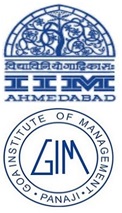CHAPTER WISE SUMMARY Macroeconomic Policy in India Since the Global Financial Crisis - Trends, Policies and Challenges in Economic Revival Post-COVID
Research & Publication (Miscellaneous)
Estimating the Likely Total Infections and Deaths Due to COVID19 in Select Countries (Version April 1, 2020)
Abstract Using a logistic model of cumulative cases and deaths it would soon become possible to give estimates to the final numbers of cases and deaths that are likely on account of COVID19, for countries which have gone through about 60+ days since the first cases were recorded. Su
Examination Of Affordable Housing Policies In India
This paper provides a critique of the Indian Government’s programmes for affordable housing, namely the Rajiv Awas Yojana and Housing for All 2022. It analyses the efficacy of these policies in being able to provide the sections of the population who are unable
International Foray Of Karuturi Global Ltd.
Karuturi Global Ltd. (KGL) is an Indian MNC which expanded overseas and has developed as one of the world’s top 25 transnational corporation in less than 15 years of its incorporation. It is one of the leading producers of cut roses with operations in Ethiopia,
Issues In Water Rights, Institutional Design And Pricing That Need Resolution
This paper briefly outlines the core issues that need resolution before water development, especially by the private sector, and efficient usage can take place. These water rights ought to be defined more functionally in order to include tradability. There is a need t
Economic Performance Of Gujarat In Recent Times
This paper reviews the growth and development of Gujarat, one of India's leading industrial states, and the reasons for its relatively high growth. It presents a synoptic review of the performance of the Gujarat economy since independence bringing out the underlying r
Role Of Trade And Macroeconomic Policies In The Performance Of Special Economic Zones (SEZS)
Special economic zones (SEZs), following the enormous success of China, have been widely imitated. But it is to be entirely anticipated that the results would vary greatly. Earlier avatars of SEZs in the form of Foreign Trade Zones (FTZs) and Export Promotion Zones (E
Container Train Operations: Introducing Competition (A)
In May 2005, the Committee on Infrastructure took a decision that Ministry of Railways, in consultation with Planning Commission, would prepare a policy for permitting private and public sector operators to run container trains through the Indian Railways (IR) network
Container Train Operations: Introducing Competition (B)
In October 2005, the representatives of the Planning Commission, Ministry of Railways, Ministry of Commerce and Industry, and Ministry of Shipping met to discuss the RITES recommendations to work towards framing a policy document for running container trains by private
Issues In Real Estate And Urban Management: A Note
The Real Estate sector has become a very important growth sector after the liberalisation of the economy; it is the second largest employer in India, next only to agriculture, and it accounts for about 5% of the country’s GDP. The sector has significant linkages
Reform Of The Fiscal And Subsidy Regime For The Petroleum Sector (Based On A Report Commissioned By The Petroleum Federation Of India)
Reform of the oil sector is long overdue. The problems in the sector emanate from the structure of central taxes and the system of price subsidisation. Solutions to the problems need to address both tax and subsidy aspects simultaneously. The social losses from this p
FDI Outflows From India: An Examination Of The Underlying Economics, Policies And Their Impact
This paper discusses the trends in India's outward FDI over the last decade and then attempts to identify the driving factors for the same. The aim is to provide policy makers with insights regarding levers which would help in encouraging FDI outflows and to stimulate
Land Markets In India: Distortions And Issues
There are certain inherent problems with land because of its peculiar characteristics, which impede the natural emergence of a well-functioning market. The legal and regulatory framework can potentially overcome these problems. In India, despite some reform efforts, t
Towards Reform Of Land Acquisition Framework In India
The paper brings out the fundamental as well as the more important problems with the current framework of land acquisition in India, regulations on land and the functioning of land markets. It argues that reform is overdue and the current framework would be unsustaina
Simhadri Super Thermal Power Project (A)
The Indian electricity sector was opened to the private sector under the Independent Power Producer’s (IPP) policy. The National Thermal Power Corporation (NTPC), India's largest and perhaps most efficient generator had to respond to the changing scenario. It se
Simhadri Super Thermal Power Project (B)
This case follows case (A) which discusses National Thermal Power Corporation’s (NTPC)- response to the Simhadri project that created a record of sorts in timely implementation of large projects and within a tight budget NTPC’s record of 39 months for a gr
A Scheme For Efficient Subsidisation Of Kerosene In India
The total fiscal losses on account of kerosene subsidisation are in excess of Rs. 24,000 crore; far above the conventional estimates which do not recognise the fiscal cost of diversion and adulteration. These distortions are very severe. Worse still are the “thi
Rural Infrastructure Needs A Fillip
The article evaluates the scope of rural development in India. It demonstrates that the Indian states weaknesses in cross-functional policy design and in coordination across departments and functions is the obvious cause of lack of rural development, and urges to reco
Efficient Subsidisation Of LPG: A Study Of Possible Options In India Today
The paper holds a discussion on the announcement contained in the budget that the central government would actively explore the option of using an appropriate form of the ‘food stamps’ or an alternative scheme to improve the efficacy and reduce the cost of
Privatisation Today: A Discussion
The paper holds a discussion on the prospects of Privatization in India today. It suggests that privatization as such is no longer an issue in the country. The issue today is how best to carry the process forward and the priorities for privatization. It highlights tha
The Beginnings Of Distribution Reforms In West Madhya Pradesh: A Report
Despite opening up the sector to private participation through independent power producers (IPPs), the actual progress of reforms in electricity has been atrociously slow. The unbundling of the industry by trifurcating the SEB and allowing private participation in the
India Infrastructure Report 2004: Overview
The text discusses and summarises the principal findings of the various articles in the report. It also develops the theme of ensuring value for government expenditures through inter alia Public Private Partnerships (PPPs) and Public Finance Initiatives (PFIs). Government expenditures on vital so
Competition, Regulation and Strategy: The Information Technology Industry
The Information Technology (IT) industry, both software and hardware, is characterised by 'vast consumer side scale and scope economies' which are incomparably larger than in other industries with supply side network economies like pipelines or electricity distributio
Expenditure Accountability in India: The Interlinkages
The chapter brings out the nature of public expenditure accountability in India especially at the federal level. The perversities - large role for off budget items, the process that leads to expanding expenditures with little functional but much procedural control, ar
Public Investments in India: Delays and Cost Overruns
Public Investments in India have witnessed large delays and cost overruns. The same are estimated and shown to continue to be large, even though they have declined despite many changes in economic policy. What has brought about change in efficiency of overall investme
India Infrastructure Report 2003: Overview
The third report covers the processes involved in government expenditure and the perversities therein that result in poor accountability. A very broad approach of the expenditure process has been taken. The discussions are driven by the need for and the feasibility of
The Challenge of Governance of India Today
This chapter attempts to delineate the possible role of governance oriented reform in India today. It raises conceptual and historical difficulties with the notion that sees governance failure as the cause of poor economic performance and discusses why there are certa
India Infrastructure Report 2002: Overview
Second in the series, this report lays bare the policy and organisational failures that have spawned poor governance in India. It argues that rather than viewing poor governance as a cause, it has been more an effect. Many of the vested interests of today have been cr
The Growth And Transformation Of Small Firms In India
The book covers the growth and transformation of small industries in the nineties and before. It addresses policy issues and makes radical suggestions on how small industries can become the leading edge of India's competitiveness. Inter alia it covers the i
India Infrastructure Report 2001: Overview
The first in the series, the book reviews infrastructure development since the reform of the Indian economy began in 1991, discussing the policies required to create an appropriate market structure for infrastructure provision along with its constraints as well as lay
Infrastructure Development And Financing: Towards A Public-Private Partnership
This book initiated academic work in the area of private investment in infrastructure in India. Divided into five parts, the book contains eleven articles and thirteen case studies on power, telecom and transportation. In this book, infrastructure development and fina
Agriculture: A Perspective From History, The Metrics Of Comparative Advantage, And Limitations Of The Market To Understand The Role Of State In A Globalising World
In this paper, Australian data on national and regional employment numbers is examined, with a focus on whether there have been common national and regional changes in the volatility of employment. A subsidiary objective is to assess whether the results derived from t
Holding Companies, Performance Contracts And Task Orientation In Public Sector
Two mechanisms being actively pursued to reform the system of public enterprises in India are the holding company and the performance contract or the Memorandum of Understanding (MoU). These have no doubt been useful; the government itself has pinned much hope on the
Blog (Miscellaneous)
A Video Presentation : Will the Stimulus of Rs. "20 lakh crore" Work to Arrest the Economic Crisis? An Assessment
Will the Stimulus of Rs. “20 lakh crore” Work to Arrest the Economic Crisis? An Assessment
The Deepening Crisis of the Indian Economy
This VIDEO Presentation[from 15 minutes onwards] is preliminary to a working paper that I would soon be bringing out on a tragedy that is going
Macroeconomic Challenges Posed by the COVID19 in India
Massive intervention in the capital markets to greatly enhance liquidity and reduce the policy rates would be necessary. Otherwise the financial sector would tumble like nine pins. We suggest a rate cut by 1.5% and massive injection of liquidity well above the r
Exporting Onions v/s Higher Learning
The HRD minister thinks he is doing right by preventing IIM, Bangalore, from taking up its Singapore campus project. First, the minister has violated the earlier permission granted to IIM-B by his own ministry. This is illustrative of a major risk i
Restructuring The Oil Companies
Finally there is recognition that the public sector oil companies need to merge to allow them the size to be able to hold out against larger companies. All kinds of red herrings are being put forward and it is important that we do not get this wrong. We have already w
Petroleum: Remove Price Control, Reform Taxes
The administered pricing mechanism (APM) for oil products was dismantled in April 2002. But the nightmare continues for oil companies, investors, consumers and even the government. At least the APM had a ‘logic’, however questionable. To call what we


